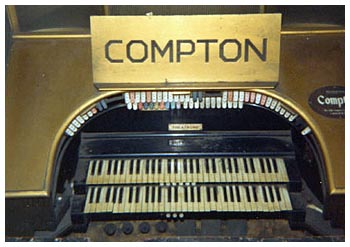
The Rex Compton Theatrone |
|
The first resident organist was Walford James - a young man from Tonypandy then aged 17 who had had some cinema organ experience at Boscombe before coming 'home'. He also managed the 'Cosy' cinema in Aberdare town for the same company. However, the organ was actually opened by Max Bruce who, although not well known, was an excellent musician and held the distinction of having been the first organist at the Tower Ballroom, Blackpool in 1929 before Reginald Dixon arrived the following year. |
|
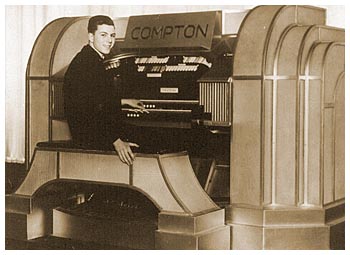 |
Walford went to live in the London area in 1940 to play at the State, Dartford and the Capitol, Wembley. After service in the R.A.F. he went into music teaching and examining, and played the church organ. He retired to West Wales in the mid 1980s where he lived until his death in 1994. Left: Walford James at the Compton |
Walford was followed by Doreen Chadwick, another youngster (aged 18) who was from Maes-y-Coed, Pontypridd and had been taught by Gene Lynn at the Castle cinema, Merthyr Tydfil. She went on to great acclaim with Granada cinemas in London, and later in the 1950s at the Gaumont, Manchester. She is still playing (2005) in her 80s and has made many recordings and broadcasts. Right: Doreen Chadwick |
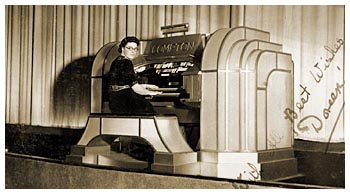 |
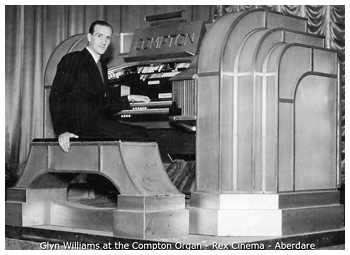 |
Another well known musician who played at the Rex in the 1950’s was Glyn Williams. He was a local man from Godreaman whose musical background included a spell playing in the R.A.F. He worked at the Brecon Meat Supply, Aberdare (now Joys Florist). During his years at the Rex he would play songs from the newly formed hit parade, and take requests at the box office. (thanks to Eric Williams for the photograph and information) |
The Compton wasn't a run-of-the-mill cinema organ. Most organs in cinemas were pipe organs (such as the one at the Castle cinema, Merthyr Tydfil), although many of the public didn't realise this as the pipes were always hidden away behind decorative plaster grille-work. In the mid-30s the John Compton Organ Company of London had pioneered an electronic add-on to their cinema organs called a 'Melotone', and by 1938 this had been developed into a complete instrument in its own right. Those installed in churches were called 'Electrone' whilst the cinema model was called a 'Theatrone'. By 1939 the age of the cinema organ was nearly over, so they only actually built about a dozen before the war, but there were a few put into hotels and dance halls later in the 1950s before production ceased altogether. The Rex organ was one of the best Theatrones built before the war as it was equipped with very good amplifiers and a very large array of speakers installed behind the grille at the left of the stage. It also had the standard Compton console with illuminated glass surround. Right: A Compton advertisment |
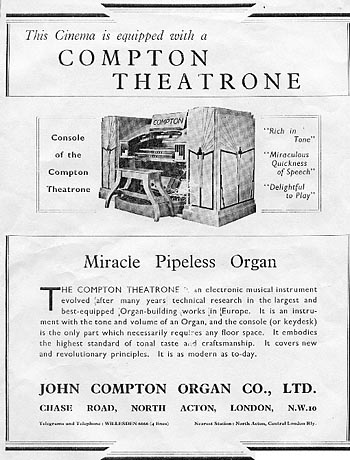 |
Above: The Compton just after the boards which covered it in had been removed |
At some point in the period after the Second World War the organ fell into disuse. With television taking audiences away from cinemas the services of an organist were not only old-fashioned but uneconomic. Eventually the orchestra pit at the Rex was boarded over and the organ all but forgotten. In the 1970s at least two people had tried to buy it, but the cinema's owner declined to sell. The Rex eventually closed in 1983 and the organ was then disposed of to an enthusiast near Cardiff, but once he got it home he decided that it was beyond restoration and the following year he put it up for sale again. It was spotted by one of the people who'd originally tried to buy it, and very soon it was taken to his home in Neath where he spent the next three years restoring it to playable condition. In 1987 - as its owner had by then acquired a pipe organ - it was sold again, and for a time was playing in a hall on the Isle of Wight. A change in circumstances of its custodian there meant that it had to be removed and placed in store, where it remained for the next 8 years. |
| Stephen Dutfield made contact with the then owner at the beginning of 2003, and in April of that year, travelled to Ventnor with a large van to collect the organ. The original loudspeakers had disintegrated before it was removed from the cinema, and the original valve amplifiers had been scrapped, but the console and the cabinet which contains all the electronic components were found to be complete, although very dirty. He has since obtained a smaller set of Compton valve amplifiers and a matching large Compton speaker cabinet, and hopes to commence restoration of the Rex organ later this year (2005). | 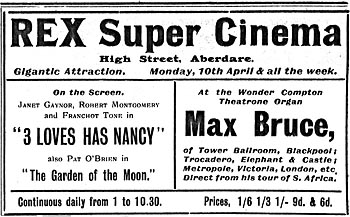 |
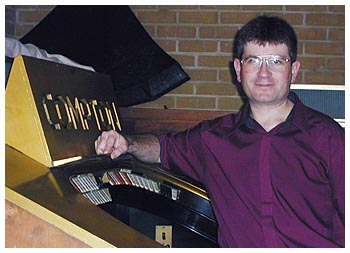 |
We would like to thank our contributor Stephen J Dutfield for all the information provided on this web page. Left: Stephen J Dutfield standing alongside the Compton Theatrone |
